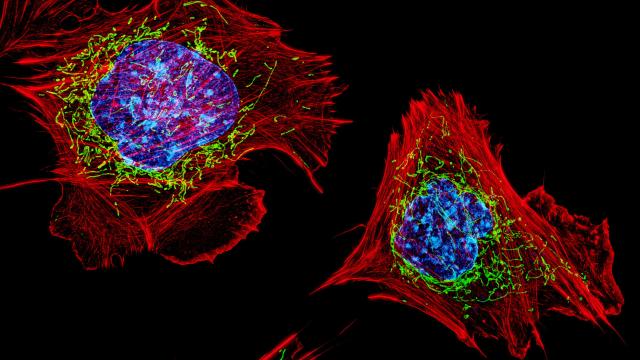You probably learned two things about mitochondria in high school biology. First, they’re the powerhouses of the cell. Second, you can only inherit them from your mother. But a new study seems to cloud that second point.
A team of researchers from the United States, China, and Taiwan identified three unrelated families with members whose mitochondria contained DNA from both parents. While this discovery could reignite debate about the nature of inheriting mitochondrial DNA, the researchers hope it will open up new ways to treat disease.
The story began when a four-year-old patient suffering from fatigue and muscle pain was referred to physician-scientist Taosheng Huang at the Cincinnati Children’s Hospital Medical Center. Others had suggested the boy was showing signs of a mitochondrial disorder, so Huang sequenced and analysed the boy’s mitochondrial DNA — and found an abnormally high level of “heteroplasmy,” meaning different mitochondria seemed to contain different genes.
Mystified, he sequenced the mitochondrial DNA of the boy’s other family members, including his sisters, parents, grandparents, and siblings of his parents and grandparents. It appeared that the boy had, as expected, received his strange mitochondria from his mother, who shared the high level of heteroplasmy. But further analysis revealed that his mother, grandfather, and two of his great aunts had inherited mitochondrial DNA from both parents.
Huang reached out to other labs, looking for families with members who similarly had high levels of heteroplasmy. He found two with similar patterns, where certain individuals seemed to inherit mitochondrial DNA from both parents, which mothers would then pass on to their own children. And to further remove doubt, Huang enlisted the Baylor College of Medicine to take independent blood samples and sequence the three families’ mitochondrial DNA on their own. Their results confirmed Huang’s.
These results are naturally provocative, as several other attempts to show mitochondrial DNA passed from both parents or from the father to the child have turned up negative. Gizmodo has reached out to several outside sources for comment, and will update the post when we hear back.
It’s unclear how male mitochondria would make it into an egg, since the egg destroys the sperm’s mitochondria after fertilization. The new paper, published in the Proceedings of the National Academies of Sciences, proposes that perhaps a mutation turns off the egg’s mitochondrion elimination abilities.
This study likely doesn’t have huge implications on evolutionary timescales where maternal inheritance remains “absolutely dominant,” the authors write — it’s an exception to a rule. But Huang was more interested in what the result could mean for treating disease.
You may be familiar with another project, in which researchers produced a baby from three parents — an egg from a donor, the nucleus from a mother, and sperm from a father. This was to prevent the mother from passing along Leigh syndrome.
“It’s a very complicated and costly procedure,” Huang explained to Gizmodo. Perhaps, if they can find the mechanism by which to transfer the father’s mitochondria instead of the mother’s, they’d be able to offer these options without the three-parent procedure.
It seems it can sometimes be hard to find firm rules in biology, even when it comes to the most well-accepted facts.
[PNAS]
